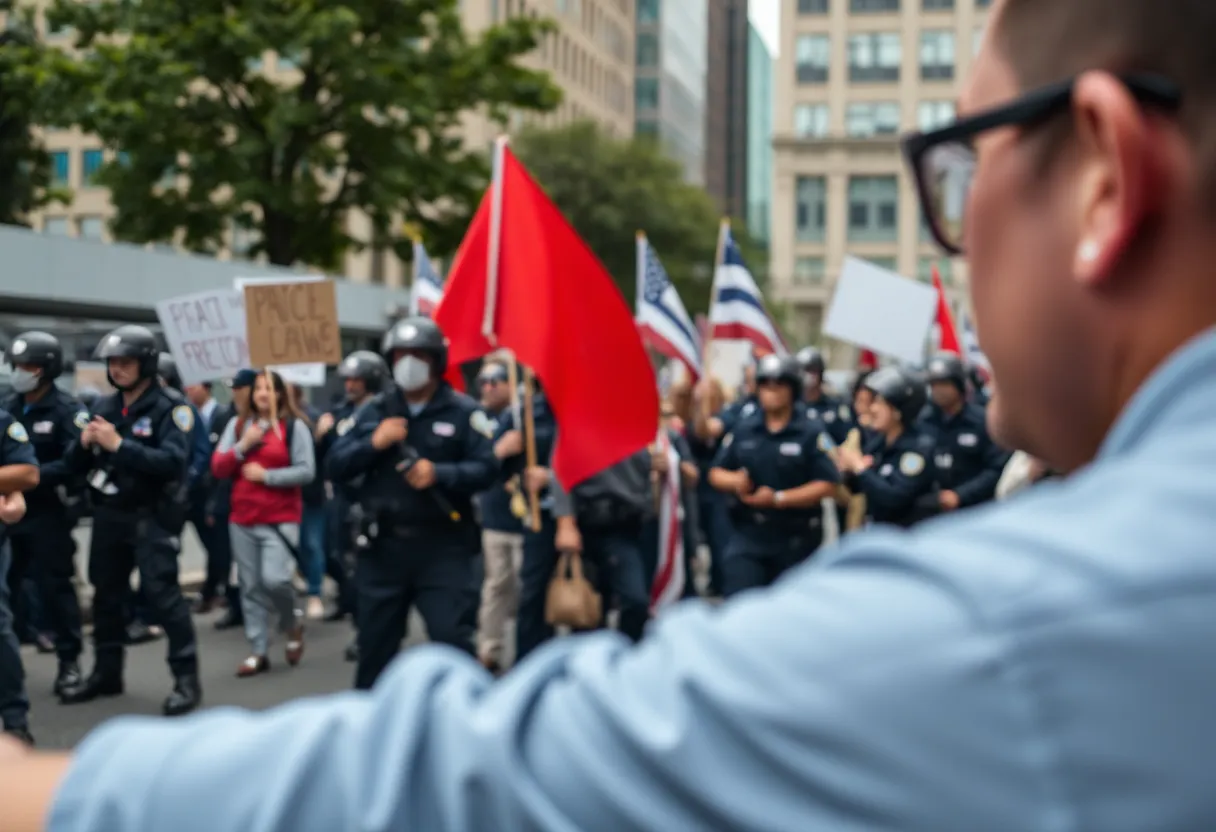News Summary
In Ann Arbor, Michigan, a series of controversial raids targeting pro-Palestinian protesters has ignited a heated debate about free speech and activism. Conducted by the Attorney General’s office, these raids, which involved local police and FBI agents, aimed to address vandalism linked to the Palestine cause. The community is questioning the necessity and motivation behind these actions, raising concerns about potential repression of political expression.
Raids in Michigan Spark Controversy Over Free Speech
Ann Arbor, Michigan, has recently found itself at the center of a heated debate following a series of controversial raids led by the Michigan Attorney General’s office. The raids, taking place on April 23, 2025, targeted pro-Palestinian protesters connected to the University of Michigan and have raised significant questions about free speech and the impact of law enforcement on activism.
Details of the Raids
These raids were executed in residential neighborhoods across Ann Arbor, Ypsilanti, and Canton, involving not only local police but also FBI agents. Authorities were searching for evidence related to what they described as “coordinated criminal acts of vandalism” that have plagued Southeast Michigan.
During these operations, nine individuals were detained. However, after a short time, they were released without any charges being filed against them. This lack of charges has fueled questions about the necessity of the raids and the intentions behind them.
Background of the Investigation
This investigation dates back to incidents of vandalism reported as early as February 2024, summing up to damages of around $100,000. Alleged acts included smashed windows, the use of chemical substances, and graffiti that prominently featured political slogans supporting the Palestinian cause. The timing of these incidents coincided with escalating unrest and protests in response to the ongoing Israel-Hamas conflict, particularly on the University of Michigan campus.
Allegations of Political Motivation
Critics of the raids contend that these actions are politically motivated, suggesting that they serve as an intimidation tactic targeting young activists advocating for Palestinian rights. Several attorneys have referred to the raids as aggressive and lacking sufficient probable cause, raising concerns that they may represent an attempt to criminalize free speech.
Concerns about the judicial process used to obtain the search warrants have also emerged, particularly since these warrants were signed by a single judge. Judge Michelle Friedman Appel, known for her controversial remarks regarding pro-Palestinian events, has been accused of bias, further complicating the situation.
Defense of the Attorney General’s Office
In light of the backlash, the Attorney General’s office has defended its actions, claiming that the previous occurrences of vandalism warranted federal involvement. Nevertheless, civil rights groups argue that these local infractions could have been handled more appropriately without resorting to such heavy-handed tactics.
Community Response and Concerns
Organizations like the Council on American-Islamic Relations (CAIR) have criticized the nature of the raids, suggesting they expose a broader hostility toward Muslim and Arab students. In a concerning turn of events, reports have surfaced indicating that law enforcement collected DNA samples from students during these raids, despite no formal arrests or charges being made.
Past protests at the University of Michigan have attracted significant attention, where activists have sought to pressure the university to divest from companies believed to be linked to Israeli interests. Additionally, the Michigan chapter of the American Civil Liberties Union (ACLU) has previously filed lawsuits against the university regarding prohibitions on protest activities.
The Ongoing Investigation
As legal representatives voice their opinions, it is evident that many believe the raids reflect a troubling trend of selective prosecution aimed at stifling political expression. Activists have responded by urging peers to be aware of their rights amid fears of potential repression of political activities.
This situation has created an atmosphere of tension among students involved in advocacy, with many fearing for their safety and the safety of others working towards similar goals.
While the investigation continues, there is currently no timeline for when or if the items confiscated will be returned to those affected. For now, the community watches closely as this story unfolds, with implications that could resonate far beyond the borders of Michigan.
Deeper Dive: News & Info About This Topic
HERE Resources
Raids in Washtenaw County Spark Controversy Over Vandalism Investigation
Community Action of Orleans & Genesee Opens New Office in Albion
Michigan Raids Target Pro-Palestinian Vandalism Investigation
Raids in Michigan Target Pro-Palestinian Vandalism
Major Drug Bust in Metro Detroit: $1.2 Million in Narcotics Seized
Major Drug Bust in Branch County, Michigan Shakes Community
Raising Cane’s Set to Open in Portage, MI
Detroit Authorities Conduct Major Human Trafficking Raid, Arrest Three and Rescue Nine Women from Illicit Massage Parlors
New Salon in Farmington Hills Emphasizes Natural Hair Care as Essential Self Care
Additional Resources
- Inside Higher Ed: Union Police Raids Targeted Michigan Palestine Activists
- MLive: FBI Raids Follow String of Pro-Palestinian Incidents Around Ann Arbor
- Metro Times: Raids on Pro-Palestinian Activists in Michigan Raise Fears of Political Targeting
- Detroit Free Press: Gov. Gretchen Whitmer’s State of the State Calls for Unity
- Metro Times: Michigan AG Says Raids on Pro-Palestinian Activists Part of Crackdown
- Wikipedia: Freedom of Speech
- Google Search: Michigan raids pro-Palestinian activists
Author: STAFF HERE NOVI WRITER
The NOVI STAFF WRITER represents the experienced team at HERENovi.com, your go-to source for actionable local news and information in Novi, Oakland County, and beyond. Specializing in "news you can use," we cover essential topics like product reviews for personal and business needs, local business directories, politics, real estate trends, neighborhood insights, and state news affecting the area—with deep expertise drawn from years of dedicated reporting and strong community input, including local press releases and business updates. We deliver top reporting on high-value events such as Motor City Comic Con, Michigan State Fair, and Novi Home and Garden Show. Our coverage extends to key organizations like the Novi Chamber of Commerce and Novi Community Foundation, plus leading businesses in automotive, technology, and manufacturing that power the local economy such as Gentherm, Stoneridge, and Daifuku North America. As part of the broader HERE network, including HEREDetroitMI.com, HEREGrandRapids.com, HERENorthville.com, and HEREPlymouth.com, we provide comprehensive, credible insights into Michigan's dynamic landscape.






